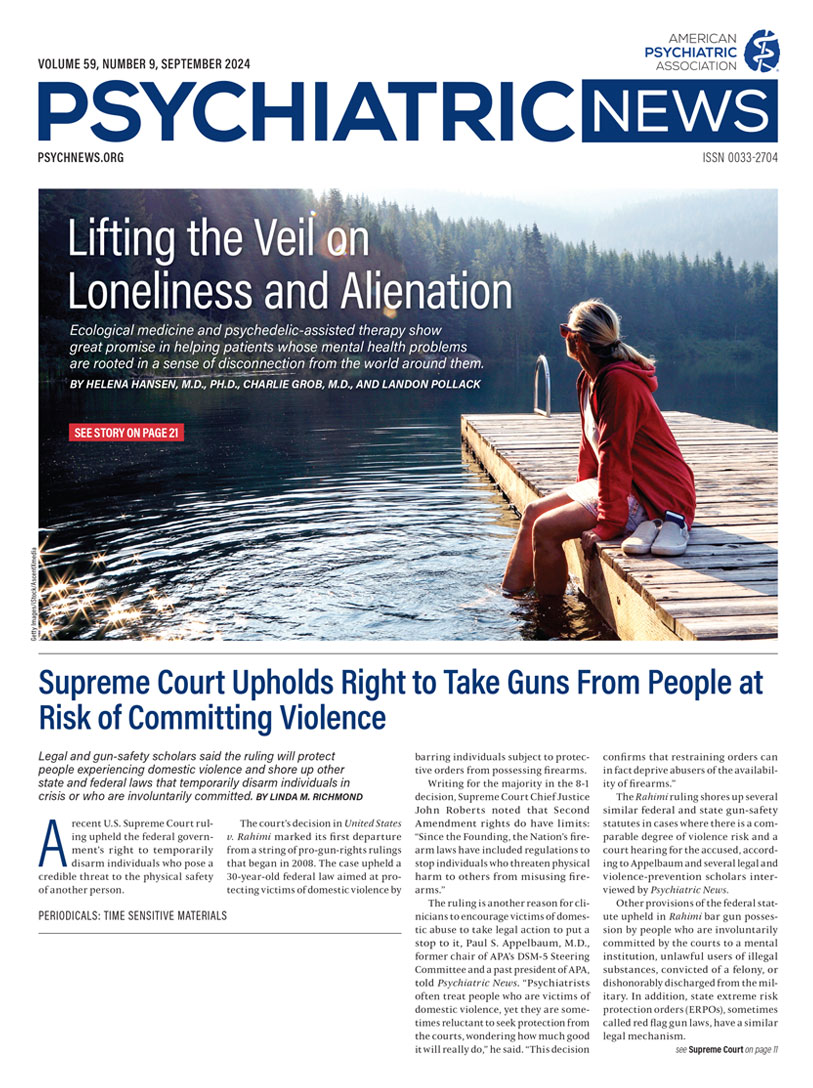What are a psychiatrist’s ethical obligations regarding confidentiality of sources of collateral information obtained in the involuntary hospitalization of a patient?
In a new opinion added to “The Principles of Medical Ethics With Annotations Especially Applicable to Psychiatry,” the APA Ethics Committee underscored that a psychiatrist’s overriding ethical obligation is to the safety of the patient, and that there can be no guarantee of confidentiality to family members or other sources who provide information that is used during involuntary hospitalization.
“Psychiatrists deal with collateral information in clinical practice routinely,” said Ethics Committee member Gregory Barber, M.D. “It’s a standard part of the job to collect collateral information in cases where a patient is hospitalized, especially involuntarily, and there can be a lot of complicated interpersonal dynamics that come up when family members provide that information.
“We obtain collateral information from people who know a patient well as a way to ensure we have a full clinical picture regarding the patient’s situation,” Barber said. “But our ethical obligations are to the patient and the patient’s safety. Psychiatrists do not have an established doctor-patient relationship with the source of collateral information and do not have obligations to keep the source hidden from patients. And we should not make guarantees that the information will remain confidential.”
The Patient’s Safety
The opinion was written in response to the following scenario submitted to the committee:
A psychiatrist was involved in a case in which the patient was involuntarily hospitalized, largely on the basis of collateral information provided by one of the patient’s family members, who indicated grave concern that the patient was acutely suicidal…. The psychiatrist agreed to protect the identity of the collateral information source, but then proceeded to document the family member’s identifying information in the electronic medical record. The patient soon discovered the family member’s identity [because the patient had access to the record] while the patient was still admitted to the hospital. This discovery caused significant conflict between the patient and the family member.
Did the psychiatrist act unethically in this situation? What obligations does the psychiatrist have to the source of collateral information? What could have been done in this case to prevent this issue, and what should be done now that this conflict has emerged?
“In cases of crisis or imminent threat to safety/wellbeing, the psychiatrist’s foremost ethical and clinical obligation is to the patient’s safety,” the Ethics Committee stated in the new opinion. “Safety concerns override concerns about conflicts in the patient’s relationships and concerns about the confidentiality of sources of collateral information. Collateral information sources are essential to psychiatrists’ clinical decision making, and collateral information should always be documented carefully in the medical record.”
The committee added that “if the source of collateral information is adamant about maintaining their confidentiality, the psychiatrist might not always need to include specific identifying information in the record, particularly if the psychiatrist knows that the patient may choose to review their medical record and the contents within at any point. While it is common clinical practice to document the source of collateral information in the electronic medical record, consideration should be made in specific situations when sensitive information is shared.”
Openness and Transparency
In addition, the new opinion noted that when a psychiatrist obtains collateral information from a source, he or she should disclose the potential that the information could be shared with the patient. “Rather than guaranteeing confidentiality to collateral sources, the psychiatrist should explain directly during the initial conversation that they may not be able to protect confidentiality, that the psychiatrist has an ethical duty to be honest with their patients, and that the psychiatrist’s ultimate obligation is to the patient and the potential for imminent threat to safety/imminent harm.”
In an interview with Psychiatric News, Barber underscored that point. “We can do our best to prevent complications in family dynamics and prevent things from becoming more interpersonally fraught in the case of involuntary hospitalization,” he said. “But ultimately our foremost ethical obligations are to the patient, the patient’s safety, and to honesty with the patient.”
Ethics Committee Chair Philip Candilis, M.D., said that “guarantees” of any kind are almost never possible in medical care. “Fidelity to the patient is the guiding principle behind this opinion,” he said. “It’s about the openness and transparency that are critical to the physician-patient collaboration and that build the trust that patients must have when they are working with us.” ■

